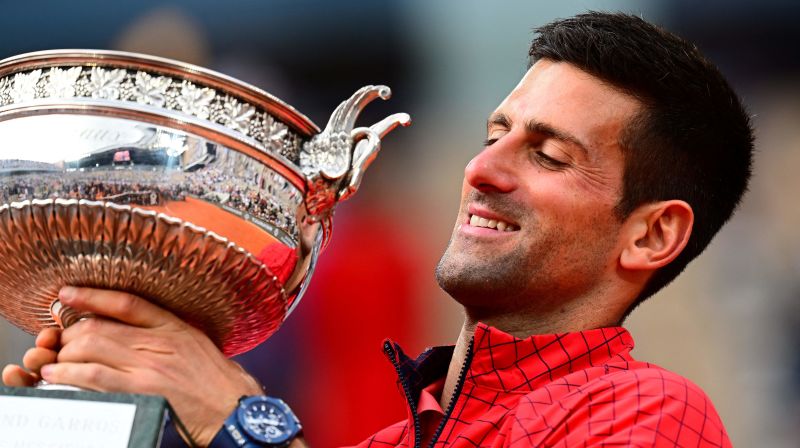
Novak Djokovic stands alone at the top of the men’s grand slam count. And he’s not done yet
As he watched Casper Ruud’s forehand loop into the tram lines, Novak Djokovic dropped to the red Parisian clay, arms and legs splayed out and wide, and started to realize what he had just achieved.
This was the moment he won grand slam number 23, surpassing Rafael Nadal at the top of the men’s all-time list. In a golden era for the sport – stretching back to Roger Federer’s first grand slam title 20 years ago – Djokovic has now eclipsed those two rivals to become the greatest male player in history.
His straight-sets victory against Ruud on Sunday was Djokovic’s third title at the French Open, making him the first man to win each grand slam at least three times. It also saw him move to the top of the world rankings for the 388th week in his career, far ahead of Federer’s 310.
“I don’t want to say that I am the greatest, because I feel, I’ve said it before – it’s disrespectful towards all the great champions in different eras of our sport,” Djokovic told reporters after the final. “I leave those kinds of discussions of who is the greatest to someone else.”
The Serbian lost just two sets at Roland Garros over the past fortnight, though his superiority in the tournament was even more extraordinary considering his challenging build-up.
Clay has never been Djokovic’s favorite surface, and in the weeks before the French Open he failed to get beyond the quarterfinals of three tune-up events while also struggled with an elbow injury.
But with history on the line, that all changed when he arrived in Paris.
“He has this software in his head that he can switch when a grand slam comes,” Djokovic’s coach, Goran Ivanišević, told reporters on Sunday. “A grand slam is a different sport compared to other tournaments.”
It was perhaps fitting that Djokovic had legendary quarterback Tom Brady – considered by many to be the greatest NFL player of all time – in his box for his final against Ruud.
Like Brady – and like Federer and Nadal – Djokovic has shown that he can win titles at what would traditionally be perceived as an advanced age for an athlete. The 36-year-old admitted that his body is “responding differently” to the rigors of top-level tennis compared to five or 10 years ago, but his mind and his desire are still willing.
“If I’m winning slams, why even think about ending a career that already has been going on for 20 years?” said Djokovic.
“I still feel motivated, I still feel inspired to play the best tennis at these tournaments the most – grand slams. Those are the ones that count, I guess, the most in the history of our sport. I look forward already to Wimbledon.”
Indeed, Djokovic added that Wimbledon will be his only grass-court tournament over the coming weeks. There, he will attempt to defend his title and take another step towards completing the calendar grand slam of winning all four majors in the same year.
The last male player to achieve such a feat was Rod Laver in 1969, though Djokovic came within one match of doing so in 2021.
Whether it’s this year, next year, or beyond, it’s hard not to see the world No. 1 adding to his 23 grand slam titles, particularly while he remains free of major injuries.
“He’s unbelievable,” said Ivanisevic, “and he’s still moving like a cat on the court … He’s going to find, again, some kind of motivation to win 24, maybe 25. Who knows where the end is?”
On the court, Djokovic’s accuracy, endurance, and extraordinary flexibility are all cornerstones of his game, enabling him to shift between defense and attack.
“Either he plays ridiculous defense or he plays beautiful winners,” said Ruud, who hasn’t taken a set off Djokovic in five matches.
“He just doesn’t do any mistakes. He either lets you go for too much or he plays a beautiful winner … He just locks in and you have to play either ridiculously well to win the points, or he steps up with a winner himself.”
Andy Roddick put it another way.
“First he takes your legs, then he takes your soul,” the former world No. 1 famously remarked about Djokovic’s game during the 2021 US Open.
No stranger to controversy, Djokovic said after his second-round match at the French Open that he is driven by the drama that has tended to follow him at grand slams.
He was referring to a political message he made about Kosovo at the start of the tournament, while also appearing to allude to the past two Australian Opens: in January, he had to explain how his father didn’t intend to support “any kind of war initiatives” having been filmed with a group of Russian supporters at Melbourne Park, and last year he was deported from Australia having arrived unvaccinated against Covid-19.
Then in 2020, he was defaulted from the US Open after striking a line judge with a ball.
But Djokovic has been all-conquering on the court in the face of these controversies, unflinching in his pursuit of tennis history. On top of his 23 grand slam titles, he has also won every Masters 1000 tournament and the World Tour Finals at least twice.
It seems a matter of when, rather than if, the most successful player in the history of men’s tennis adds to his record-breaking haul of grand slam titles.
